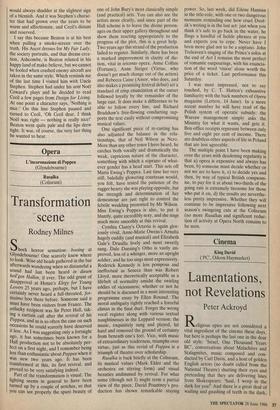Opera Rusalka (Coliseum)
Transformation scene
Rodney Milnes
Shock horror sensation: booing at Glyndebourne! One scarcely knew where to look. Wise old heads gathered in the bar afterwards wondering when so distasteful a sound had last been heard in diesen heil'gen Hallen, if ever. The odd grunt of disapproval at Henze's Elegy for Young Lovers 25 years ago, perhaps, but I have certainly never heard a full-throated, for- tissimo boo there before. Someone said it must have been visitors from France. The unlucky recipient was Sir Peter Hall, tak- ing a curtain call after the revival of his Poppea, and as is so often the case on such occasions he could scarcely have deserved it less. As I was suggesting only a fortnight ago, it has sometimes been known for a Hall production not to be absolutely per- fect on a first night, and I remember being less than enthusiastic about Poppea when it was new two years ago. It has been transformed at this, its first revival, and proved to be very satisfying indeed. Part of the transformation is visual. The lighting seems in general to have been turned up by a couple of notches, so that you can see properly the spare beauty of one of John Bury's most classically simple (and practical) sets. You can also see the artists more clearly, and since part of the Hall scheme is to leave the divine person- ages on their upper gallery throughout and show them reacting appropriately to the progress of the plot, this is a great help. Two years ago this strand of the production failed to register. Similarly, there has been a marked improvement in clarity of dic- tion, vital in seicento opera. Anne Collins (Fortune), Anne Steiger (Virtue, who doesn't get much change out of the action) and Rebecca Caine (Amor, who does, and also makes a promising festival debut) set a standard of crisp enunciation at the outset followed loyally by the remainder of the large cast. It does make a difference to be able to follow every line, and Richard Bradshaw's free-flowing conducting sup- ports the text easily without compromising musical values.
One significant piece of re-casting has also adjusted the balance in the rela- tionships, that of Neil Wilson as Nero. More than any other tenor I have heard, he catches both vocally and dramatically the weak, capricious nature of the character, something with which a soprano of what- ever gender has a head start. This sets off Maria Ewing's Poppea. Last time her very still, balefully glowering courtesan would, you felt, have tested the patience of the rugger hearty she was playing opposite, but the strength and determination of her demeanour are just right to control the febrile weakling presented by Mr Wilson. Miss Ewing's Poppea is also, to put it bluntly, quite incredibly sexy, and she sings much more smoothly at this revival.
Cynthia Clarey's Octavia is again glor- iously vivid, Anne-Marie Owens's Arnalta hugely cuddly (and musical) and Elizabeth Gale's Drusilla lively and most sweetly sung. Dale Duesing's Otho is vastly im- proved, less of a whinger, more an upright soldier, and he too sings most expressively. Roderick Kennedy is less pompous and ineffectual as Seneca than was Robert Lloyd, more theoretically acceptable as a lifebelt of normality amidst the swirling eddies of viciousness; whether or not he should be is discussed in a most interesting programme essay by Ellen Rosand. The moral ambiguity rightly reached a forceful climax in the final duet. Forget the wrong vocal register along with various textual naughtinesses in the Leppard version: the music, exquisitely sung and played, hit hard and removed the ground of certainty from beneath one's feet. Vice, with music of extraordinary tenderness, triumphs over virtue, just as this revial of Poppea is a triumph of theatre over scholarship.
Rusalka is back briefly at the Coliseum, its musical values (Mark Elder and the orchestra on stirring form) and visual beauties undimmed by revival. For what some (though not I) might term a partial view of the piece, David Pountney's pro- duction has shown remarkable staying power. So, last week, did Eilene Hannan in the title-role, with one or two dangerous moments reminding one how cruel Dvof- ak's writing is in the last act: just when you think it's safe to go back in the water, he flings a handful of Isolde phrases at you and expects you to cope. Never have I been more glad not to be a soprano. John Treleaven's singing of the Prince's solos at the end of Act I remains the most perfect of romantic outpourings, with his enuncia- tion of the word 'vision' alone worth the price of a ticket. Last performance this Saturday.
I was most impressed, not to say touched, by C. T. Hatten's exhaustive familiarity with the back numbers of Opera magazine (Letters, 14 June). In a more recent number he will have read of the Polish system of operatic subsidy: the Warsaw management simply asks the Ministry for what it wants, and gets it. Box-office receipts represent between only five and eight per cent of income. There are doubtless other aspects of life in Poland that are less agreeable.
The multiple point I have been making over the years with deadening regularity is that a) opera is expensive and always has been, b) someone must decide whether or not we are to have it, c) to decide yes and then, by way of typical British comprom- ise, to pay for it at about two-thirds of the going rate is extremely tiresome for those who put it on, d) the results are neverthe- less pretty impressive. Whether they will continue to be impressive following next season's swingeing cuts at the Coliseum (no more Rusalkas and significant reduc- tion of activity at Opera North remains to be seen.


















































 Previous page
Previous page